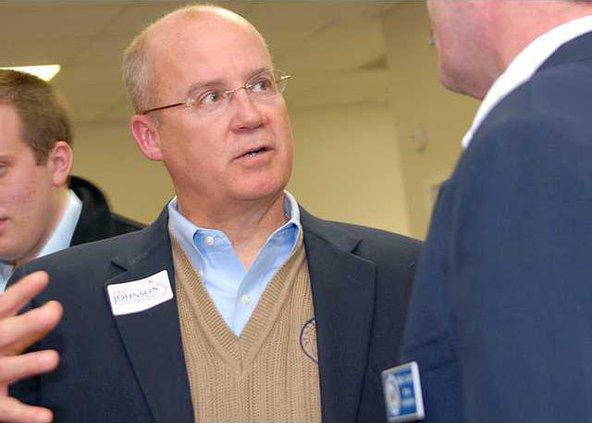They have different backgrounds and are running for different offices, but Gerry Purcell and Eric Johnson both shared the stage during a Forsyth County Republican Party meeting Tuesday night.
Johnson, who recently stepped down from the state Senate to pursue his gubernatorial bid, said he entered public service years before first being elected as a state representative in 1992.
While practicing architecture in Savannah, he started “doing what many of y’all have done."
"[I] sat in these rooms, recruited candidates, licked envelopes, put up yard signs, precinct chairman, party chairman -- and I did all of that to help build a conservative majority in this state," he said.
After two years in the state House, Johnson became a senator. Four years later, he became minority leader “because I was so aggressive in trying to become the majority, and not just go along to get along.”
“I was minority leader the same four years Roy Barnes was governor,” he said. “I am the only one in this race that has taken Roy Barnes on toe to toe and beat him. And that’s going to be important this fall.”
Barnes, who is again running for governor, faces opposition within the Democratic Party. If he were to win in his party's primary election, he will face a Republican in November.
Johnson spoke about his past conservative accomplishments and his goals for education reform, which are based on the parents’ right to choose where and how their child is educated.
Another goal, he said, is to make Georgia the Southeastern capital of the U.S., starting with nuclear power, drilling offshore and using alternative fuels from pine trees, solar and wind.
But first and foremost, he said, is the creation of jobs.
“I want to be the jobs governor,” he said. “Other candidates are talking about a whole variety of other things. It’s all about jobs.
“We’ve got to get the infrastructure built, we’ve got to worry about our entrepreneurs and small businesses and we’ve got to get that jobs engine going.”
As a long-term politician, Tuesday was not Johnson’s first time at a microphone in front of constituents.
For Forsyth County resident Gerry Purcell, however, it was a more foreign environment.
“I don’t have a political resume to offer you,” said Purcell, who is running for insurance and safety fire commissioner.
“I have never run for political office. I just decided to step right off into the big one right off the bat.”
Purcell cited his 30-year background in military, leadership and insurance experience. He served in the Army for six years during Ronald Reagan's presidency.
He spent some time at the Mobil Oil corporation, where he helped turn around five failing business units.
“What I learned from that experience was simply this: Those who have led us into the mess that we’re in are probably not going to be the ones that lead us out,” he said. “Georgia needs new leaders. New leaders in the Republican Party, new leaders for our state, and most certainly, we need new leaders for America.”
When he was 29, Purcell was diagnosed with cancer. That’s when health care became a personal issue, he said. When he became cancer free, he started a new career as a licensed insurance agent.
“Within a few years, I was a national sales director for a billion-dollar company, and in year 2000 I started my own company,” said Purcell, who faces several opponents, including fellow county resident and state Rep. Tom Knox.
Purcell has since traveled across the country, advising state governments, employers, associations and legislators in insurance, health care and how to lower cost without reducing service.
He has also met with various attorneys general on weeding out fraud in the health care system.
Among his goals for the state is to reform Georgia’s 4.75 percent premium tax added to the cost of every state policy. He will also seek to reduce the state’s 45 mandates on insurance companies, which he constrasted to Alabama’s 21.
Though Purcell has plans for Georgia, including allowing consumers to purchase insurance across state lines, he’s also keeping an eye on the federal government.
“Washington, D.C., stay out of our business," he said. "We can fix our own health care and insurance problems here at the state level.
"We don’t need D.C. to take the greatest health care system in the world, which, for the most part, is 90 percent working."




